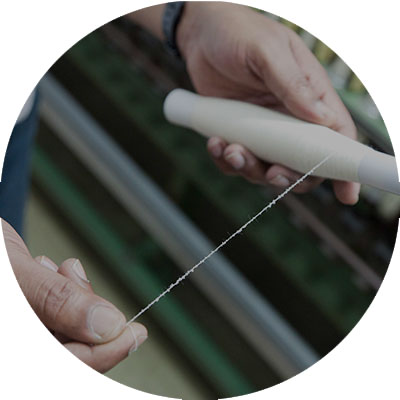Polyester Yarn
The largest share of produced yarns including synthetic and natural is made up of the polyester fibers. Polyester fibers, like all other synthetic fibers, are manufactured industrially. In terms of characteristics, they are good alternative for natural fibers, such as cotton. To produce polyester, the combination of dimethyl terephthalate and polyethylene glycol or terephthalic acid (a substitute for dimethyl terephthalate) is used in the vicinity of proper catalysts. The resulted polymer from the combination of these two primary materials pumps to the melt spinning machine and pass through spinnerette, which have specific number of holes. Under the influence of cold air, it converts into a fiber. The bundle of converted fibers, subsequently, will be treated thermally. During molecular arrangement and thermal stabilization, they form short fibers (staple) which will be cut in arbitrary sizes and packed later.
Polyester fibers have important properties such as high strength, reversibility and adequate dimensional stability, abrasion resistance, color change resistance exposed to the sunlight, and the resistance against materials used for bleaching in dry cleaning, which make this product more durable than natural fibers. Polyester is crystalline and has a unique chemical structure. It is resistant to most chemicals due to the lack of active polymers in its structure and low moisture absorption. Color stability and being iron free are other most important properties of this fabric. Moreover, it is also resistant to hot weak and cold strong acids. Dilute alkaline substances do not affect this fiber, but strong alkalis can cause damage to the fiber. The physical properties of the polyester fibers can be varied according to the demand of the market and consumer units. Polyester fibers, either could be use purely or mixed with other fibers, such as cotton, viscose, and wool, in the production of various types of yarn, curtain fabrics, clothing, cotton tricots, linens, carpet, all kinds of filters, linings, conveyor belts, tarpaulins, all different types of ropes, sleeping goods such as quilts and pillows, and many other products. Polyester fibers are produced in many countries by different commercial names, including “Trilene” in England, “Trier” in Germany, “Tergal” in France, “Tetron” in Japan, “Trital” in Italy, and “Dacron” in the United States.
Polyester fiber is produced according to the customer’s requirement for the most productive performance in any of the various textile processes, including ring spinning, spinning, open-end and vertex spinning. The polyester fibers can be used 100% purely or in a mixture with cotton and viscose with different ratios in spinning. In open-end and Vertex Spinning, the minimum amount of powder deposited on the rotor and nozzles results in the highest yield. Fibers are semi-opaque white and bright and can be produced for common uses in different colors according to customer’s requirements.
Rasan Riss manufacturing unit can produce wide range of products, ranging from semi-matte to glossy painted polyester yarns based on the latest available technology. The produced yarns are used for purposed such as ring-spinning systems, open-end and vertex spinning as well as for non-woven purposes such as fillers. This manufacturing unit is stablished based on environment friendly and energy saving standards.
Customer Satisfaction is the prime priority of the Rasan Riss and is aligned with our key belief in providing the best product quality that meets customer needs.












